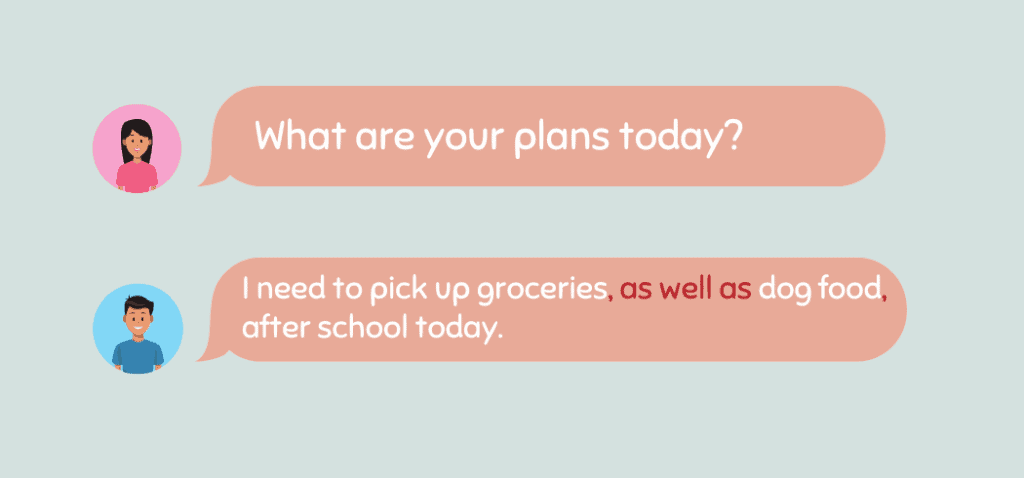Making sure your audience understands the purpose of your writing is dependent upon your word choice. When taking students to the next level in their writing with compound sentences and conjoining phrases, the rules of punctuation need to be reviewed.
Commas are the most common punctuation mark used in the English language to help create clarity and understanding in writing. Phrases like “as well as” allow you to add detail and, when properly punctuated, can be used to mean different things.
Let’s look at how this short phrase can be used and when and how to use commas with it.
How Can “As Well As” Be Used in a Sentence?

The phrase “as well as” means “in addition to” or “along with” and can be used to replace the phrases in both written text and speech. It is used to add detail or clarification to a sentence, but many people are confused as to whether a comma belongs before its use or not.
For example
- I need to pick up groceries as well as dog food after school today.
- I need to pick up groceries, as well as dog food, after school today.
Both sentences are grammatically correct. In the first sentences, you are implying that both groceries and dog food are equally important. In the second sentence, you are including dog food as an aside, implying that it isn’t as important as groceries.
“As well as” can also be used to make a simple comparison in a sentence, but this use is less confusing concerning comma usage.
For example
- I did not do as well as my friend on the science test.
As you can see in the above examples, where you place a comma can change the meaning of the sentence. The following examples help explain this further.
Do You Use a Comma With “As Well As”?
There is only one instance in which you use commas with the term “as well as.” The majority of the time you shouldn’t use a comma, and when using the term to make a simple comparison, you should never use a comma.
When Not to Use a Comma With “As Well As”
If you are using “as well as” to add detail that is equally as important as what you are connecting the detail to, DO NOT use commas.
For example
- I have a lot of work to do today; I need to invoice for my job as well as attend the awards banquet for my students.
In this sentence, both tasks are important to the completion of the day and need to be done.
NEVER use commas If you are using “as well as” to create a simple comparison between two things.
For example
- My youngest son wants to be a bear as well as a ghost for Halloween; we created our own unique ghost bear costume to go trick-or-treating in.
When to Use Commas Around “As Well As”
When you use commas with “as well as,” you are implying the information that follows the comma is not as important as what you connect it with.
When commas are used to interrupt a complete sentence, you are using them to create an aside. An aside is a nonessential clause that adds information not necessary to the understanding of the entire sentence. If it was removed, the independent clause is understandable and makes sense.
If you use one comma, you must also include a closing comma if the nonessential clause does not end the sentence.
For example
- I was excited to see the success of my students, as well as their instructors, when they were named finalists in the competition.
When to Place a Comma Before “As Well As”
The term “as well as” should be preceded by a comma when it introduces a nonessential clause that will end the sentence. You only need to use two commas when a sentence continues after being interrupted by an aside.
For example
- Don’t forget to run to the bank after work, as well as drop the book by the library.
Let’s Review
The term “as well as” can be used to mean “in addition to” or “along with” or be used to create simple comparisons. Whereas you never use a comma when it is used to create comparisons, you can use commas with the phrase when you create an aside with it.
